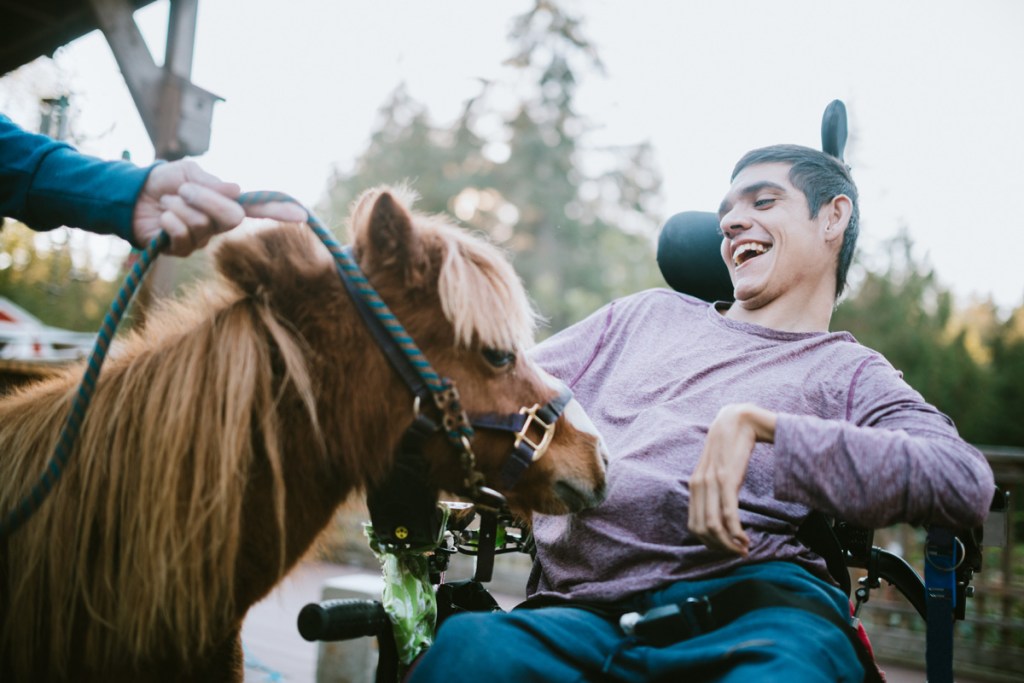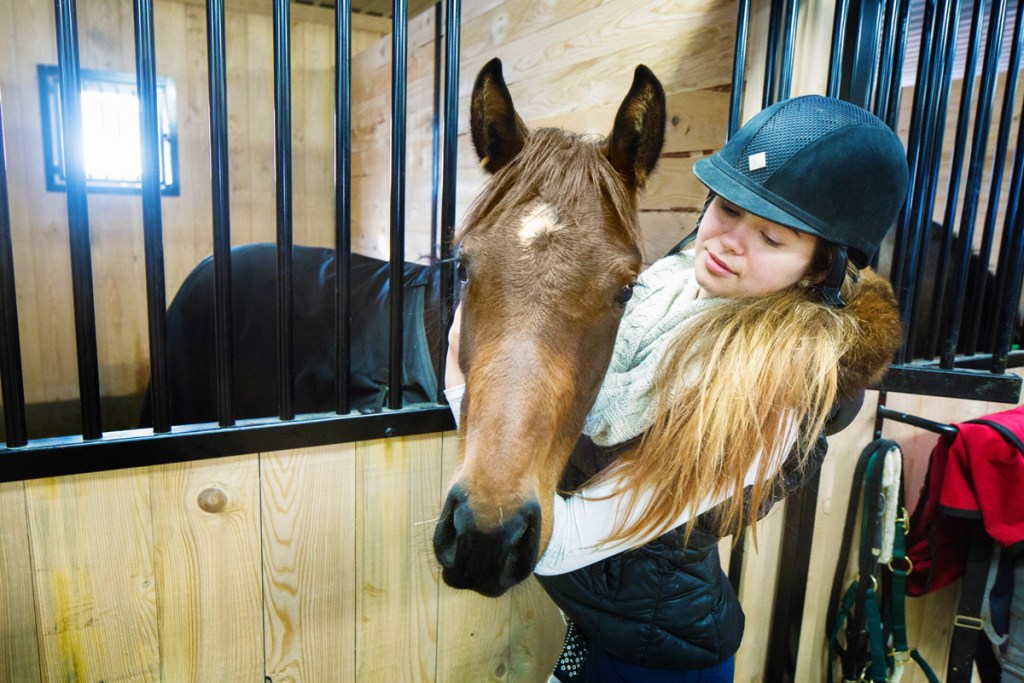When people think of therapy animals, it’s usually smaller pets like dogs, cats, or rabbits that come to mind. But the majestic horse has steadily grown in popularity for use in animal-assisted therapy programs. For example, the Professional Association of Therapeutic Horsemanship International (PATH Intl) has 813 member centers worldwide and helps support more than 53,300 men, women, and children with special needs.
What is equine therapy?
Equine therapy or equine-assisted therapy is the use of horses to improve the lives of people struggling with physical or mental challenges. Equine therapy programs are launched with different goals in mind and operated with teams that include licensed therapists, certified equine specialists, and volunteers. Some focus on mental health and may or may not include a horseback riding component while others such as physical and occupational therapy programs center around clients doing physical exercise while sitting on a horse.

How does equine therapy work?
In equine-assisted psychotherapy participants typically interact with the horses on the ground only. They groom, feed, and walk horses under the supervision of mental health professionals. According to the Equine Assisted Growth and Learning Association (EAGALA), equine-assisted psychotherapy allows clients of all ages to work on such issues as assertiveness, confidence, impulse control, and social skills.
Clients enrolled in therapeutic riding programs participate in riding lessons. These programs provide physical benefits while also emphasizing developmental, recreational, and social skills. Participants in these programs experience improved balance and coordination as well as an increased sense of well-being and self-confidence.
Hippotherapy is described by the Northern Clinics of Istanbul as physical, occupational, and speech therapy that uses the natural gait and movement of the horse to provide sensory input to special needs clients. Occupational therapists say that a horse’s natural three-dimensional movement mimics a typical human gait creating a gentle rhythmic movement that aids in improving a patient’s balance, strength, and muscle control. This therapy helps in the treatment of a wide variety of conditions including cerebral palsy, traumatic brain disorder, Down syndrome, and muscular dystrophy.
What equine-assisted therapy programs are legit?
Legitimate equine therapy programs are run by professional therapists and equine specialists who are certified to do so. This certification can be obtained through such organizations as PATH Intl, EAGALA, and the Equine Facilitated Mental Health Association.
Following are 10 equine therapy programs run by dedicated professionals and all worthy of your donation dollars:
Falcon Ridge Ranch
Falcon Ridge Ranch located at the entrance of Zion National Park in Utah is dedicated to healing girls ages 12 through 17 struggling with mental, emotional, and behavioral issues, usually stemming from trauma. Working with horses teaches the girls compassion, empathy, self-discipline, and understanding.
Horses4Heroes
The Horses4Heroes Family Equestrian Center in Las Vegas, Nevada, offers an empowering series of equestrian programs that incorporate horse care and horseback riding. Clients include veterans and first responders with post-traumatic stress disorder, victims of domestic abuse and violence, recovering addicts, and at-risk youth.
The Ranch
At The Ranch, an equine-assisted therapy program in Nunnelly, Tenn., clients get boosts in self-esteem, personal accountability, social interaction, and moral responsibility. They interact with horses on the ground, feeding, grooming, and walking them. The Ranch’s program has proven beneficial in treating several disorders including Alzheimer’s disease, depression, and anxiety.
Happy Trails Therapeutic Riding Center Inc.
This Colts Neck, N.J. equine therapy program focuses on improving the lives of children and adults with physical, emotional, and mental challenges. By helping care for the horses and learning riding skills, participants develop a sense of independence and self-confidence.
Winslow Therapeutic Center
The focus of the Winslow Therapeutic Center in Warwick, New York, is on assisting children and adults with physical, cognitive, and emotional challenges to find strength and independence in their lives through the development of horsemanship skills. Participants benefit physically, cognitively, emotionally, socially, and remedially.
Banyan Mental Health Equine-Assisted Therapy Program
The goal of this equine-assisted therapy program located in Boca Raton, Florida, is to help patients develop skills like emotional regulation and control, self-confidence, self-esteem, and responsibility. Program participants feed, pet, groom, and walk and play with the horses.
Equi-librium PA
The Equi-librium therapeutic program in Nazareth PA, uses horseback riding to help people with a wide variety of disabilities including autism, bipolar disorder, cancer, cerebral palsy, developmental delays, Down syndrome, and other intellectual disabilities, and language impairments.
Northern Virginia Therapeutic Riding Program
This therapeutic riding program located in Clifton, Virginia, provides equine-assisted activities to a wide variety of people including those with disabilities, at-risk youth, and recovering military personnel.
Colorado Therapeutic Riding Center
This therapeutic riding center located in Longmont, Colorado, combines hands-on care of horses and riding skills to help clients develop physical, mental, and emotional growth. The center also offers equine-assisted therapy using the movement of the horse to benefit a client’s motor development and coordination.
Trot On: Equine Therapy Program
Based in Needham, Massachusetts, this equine therapy program is part of the Justice Resource Institute and helps clients of all ages overcome social, emotional, and behavioral challenges using horse-related activities and therapeutic riding instruction.

In conclusion
If you’ve ever spent time around horses, then you know that these gentle giants help us to live in the moment, always leaving us feeling better having been in their company. According to a Verywell Mind article, horses make terrific therapy animals because they “often mirror a client’s behavior or emotions, conveying understanding and connection that allows the client to feel safe.” It’s no wonder then that equine therapy continues to gain popularity in the treatment of mental health issues.
Editors' Recommendations
- What causes high pH in an aquarium? We’ll walk you through getting your tank levels in check
- Is my rabbit pregnant? 5 telltale signs you should know
- Check these 3 things immediately if you have fish swimming at the top of the tank
- Can you make a profit breeding your bearded dragon?
- Bunny care 101: If Easter inspires you to adopt a rabbit, read this first




